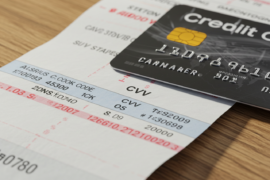This article may contain references to products or services from one or more of our advertisers or partners. We may receive compensation when you click on links to those products or services. Nonetheless, our opinions are our own.
Secured credit cards can be a great option for individuals looking to build or rebuild their credit. Unlike traditional credit cards, they require a security deposit, which serves as collateral and minimizes risk for the issuer. It makes them a popular choice for those with no credit history or a poor credit score.
However, the term guaranteed approval can be misleading. While secured credit cards often have less stringent eligibility criteria, they may still involve some level of assessment, such as verifying identity or ensuring the deposit meets minimum requirements. Understanding these nuances is crucial for anyone considering this financial tool.
- What Are Secured Credit Cards?
- How Secured Credit Cards Work
- What Does Guaranteed Approval Mean?
- Do all Secured Credit Cards Have Approval Requirements?
- Common Eligibility Criteria for Secured Credit Cards
- How to Increase Your Approval Odds
-
Frequently Asked Questions
- Does guaranteed approval mean instant approval for secured credit cards?
- Is a deposit always required for secured credit cards with guaranteed approval?
- Is guaranteed approval affected by existing credit card debt?
- Can non-residents apply for secured credit cards with guaranteed approval?
- Are there hidden fees associated with guaranteed approval secured cards?
- Recommended Reads
What Are Secured Credit Cards?
Secured credit cards help individuals build or restore their credit. In contrast to traditional credit cards, secured ones require a security deposit upfront, which acts as collateral. The deposit typically determines the credit limit—if you deposit $500, your credit limit is $500. It makes secured credit cards a lower-risk option for issuers, who can use the deposit to cover unpaid balances in case of default.
Secured credit cards function just like regular credit cards for purchases and payments. Cardholders can use them to make transactions, pay off balances, and improve their credit score responsibly. Over time, consistent on-time payments can help build a positive credit history, making secured cards a valuable tool for anyone starting or rebuilding their credit journey.
How Secured Credit Cards Work
While secured credit cards function similarly to regular credit cards, they come with a unique feature: they require a security deposit. Here’s a step-by-step breakdown of how they work:
- Application and Deposit: To open a secured credit card, apply with the issuer and provide a refundable security deposit. The deposit acts as collateral and typically determines your credit limit. For example, if you have a $500 deposit, your card’s limit is often $500.
- Using the Card: Once approved, you can use the secured card just like a regular credit card for everyday purchases, bill payments, or online shopping. The issuer will report your activity to credit bureaus, helping you build a credit history with responsible use.
- Making Payments: Each month, you receive a statement showing your transactions and the amount you owe. You must pay at least the minimum amount due, though paying the total balance is ideal to avoid interest charges.
- Improving Your Credit: Consistent on-time payments and low credit utilization can positively impact your credit score. Over time, this responsible behavior can help you qualify for unsecured credit cards or other financial products.
- Refund of Security Deposit: If you demonstrate good financial habits, some issuers may upgrade you to an unsecured credit card and refund your security deposit. Alternatively, you can close the account and have your deposit returned, provided there’s no outstanding balance.
Secured credit cards are a powerful tool for credit building, but success depends on responsible use and understanding the terms and fees associated with the card.
What Does Guaranteed Approval Mean?
Guaranteed approval often creates the impression that anyone who applies for a secured credit card will automatically be approved. However, even secured credit cards with less stringent requirements may have certain conditions that applicants must meet.
Guaranteed approval generally means that the credit card issuer does not evaluate an applicant’s credit history as strictly as traditional credit cards. This makes secured credit cards more accessible for individuals with bad credit or no credit history. However, it doesn’t eliminate all eligibility criteria. Applicants typically need to:
- Provide Identification: Issuers require proof of identity and legal residency, such as a government-issued ID and a Social Insurance Number (SIN).
- Pay a Security Deposit: Approval is contingent on providing the required deposit, which usually determines the credit limit.
- Meet Age and Income Requirements: Applicants must meet the minimum age for a credit card and may need to prove they have a source of income to cover the card payments.
While “guaranteed approval” may sound appealing, it’s important to understand that it still involves basic requirements. Additionally, some issuers may reject applications if they suspect fraud, incomplete information, or issues like recent bankruptcies. Always review the fine print to ensure you meet the criteria before applying.
Do all Secured Credit Cards Have Approval Requirements?
While secured credit cards are known for their accessibility, they are not entirely free of approval requirements. Even though they are easier to obtain than unsecured credit cards, issuers still set certain basic conditions that applicants must meet. These requirements ensure that the issuer can trust the applicant to manage the account responsibly.
Here are some approval requirements for secured credit cards:
- Security Deposit: The most fundamental requirement is the ability to provide a refundable security deposit. This deposit determines your credit limit and acts as collateral if you default on payments.
- Proof of Identity and Residency: Issuers require applicants to verify their identity and legal residency. This involves providing documents like a government-issued ID, proof of address, or a Social Insurance Number (SIN) in Canada.
- Age Requirement: Applicants must meet the minimum legal age for obtaining a credit card in their region, typically 18 or 19, depending on the province.
- Income Requirements: Although credit score checks are often lenient or skipped, some issuers may still require proof of income to ensure you can manage the monthly payments.
- No Recent Bankruptcies: Certain issuers may reject applicants with an ongoing or recent bankruptcy because it signals a high-risk profile.
It’s worth noting that approval requirements can vary between issuers. While some secured credit cards have more flexible criteria, others may impose stricter conditions or conduct a basic credit check to assess your financial behavior.
Before applying, review the card’s terms and conditions to understand what is required, ensuring you’re fully prepared to meet the criteria and secure your card.
Common Eligibility Criteria for Secured Credit Cards
Secured credit cards are a great option for individuals aiming to build or restore their credit, but they still have certain eligibility requirements. While these criteria are generally more lenient than those for traditional credit cards, they help issuers ensure responsible account management. Here are the most common eligibility criteria for secured credit cards:
- Security Deposit: A refundable security deposit is a key requirement. The deposit acts as collateral and usually determines your credit limit. Most issuers require a minimum deposit, ranging from $200 to $500 or more.
- Proof of Identity and Residency: Applicants must provide valid identification, such as a government-issued ID or passport, along with proof of legal residency, like a utility bill or bank statement.
- Minimum Age Requirement: You must meet the legal age for a credit card in your province or country. In Canada, this is typically 18 or 19, depending on the region.
- Income Verification: While secured credit cards don’t always require a high income, some issuers may ask for proof of steady income to ensure you can manage monthly payments.
- No Recent Bankruptcies: Although credit checks are often less stringent, some issuers may deny applications from individuals with recent or unresolved bankruptcies, as it poses a financial risk.
- Active Bank Account: Many secured credit card issuers require an active bank account to process the security deposit and facilitate payments.
- Residency Status: Applicants typically need to be legal residents or citizens of the country where they are applying for the card.
Meeting these eligibility criteria is usually straightforward, making secured credit cards accessible to various applicants. Always check the specific requirements of the card issuer to ensure a smooth application process.
How to Increase Your Approval Odds
While secured credit cards are designed to be more accessible, taking certain steps can improve your chances of getting approved. Here’s how to strengthen your application and maximize your approval odds:
- Save for the Security Deposit: Ensure you have enough funds to cover the required security deposit. Having a deposit ready shows the issuer you’re serious about managing the account responsibly.
- Ensure Your Information Is Accurate: Double-check your application to ensure all personal and financial details are accurate. Errors or missing information can lead to delays or rejection.
- Provide Proof of Stable Income: Even if the card doesn’t require high income, demonstrating steady earnings can reassure issuers of your ability to make monthly payments. Provide documents such as pay stubs, tax returns, or bank statements.
- Resolve Outstanding Debts or Issues: If you have unresolved financial issues, such as unpaid bills or collections, address them before applying. Clearing these up can reduce your perceived risk to the issuer.
- Avoid Recent Bankruptcies: If you’ve recently filed for bankruptcy, wait until it is discharged before applying for a secured credit card, as many issuers deny applications under these circumstances.
- Open a Bank Account: An active bank account is often required for secured credit cards. It also demonstrates financial stability and makes it easier for issuers to process payments and refunds.
- Research Card Requirements: Each card issuer has different criteria, so research your options to find cards with requirements you can easily meet. Some cards have more lenient approval policies than others.
- Start with Entry-Level Cards: If you’re new to credit or have a poor credit history, target secured credit cards specifically designed for beginners or those rebuilding credit, as these tend to have lower barriers to entry.
By preparing thoroughly and demonstrating financial responsibility, you can significantly improve your approval odds, helping you take the first step toward building a stronger credit profile.
Frequently Asked Questions
Does guaranteed approval mean instant approval for secured credit cards?
No, guaranteed approval doesn’t mean instant approval. Issuers may take time to verify your identity, deposit, and eligibility criteria.
Is a deposit always required for secured credit cards with guaranteed approval?
Yes, a deposit is mandatory for secured credit cards, even with guaranteed approval, as it acts as collateral and determines your credit limit.
Is guaranteed approval affected by existing credit card debt?
Yes, existing credit card debt can impact approval. While issuers are lenient, unresolved debts may still be considered.
Can non-residents apply for secured credit cards with guaranteed approval?
Non-residents typically cannot apply unless they meet specific residency requirements, like providing a SIN or similar identification.
Some cards may include hidden fees, like application or maintenance charges. Always review the terms to understand all associated costs.

Reviewed and edited by Albert Fang.
See a typo or want to suggest an edit/revision to the content? Use the comment form below for feedback.
At FangWallet, we value editorial integrity and open collaboration in curating quality content for readers to enjoy. Much appreciated for the assist.
Did you like our article and find it insightful? We encourage sharing the article link with family and friends to benefit as well - better yet, sharing on social media. Thank you for the support! 🍉
Article Title: Do Secured Credit Cards Offer Guaranteed Approval?
https://fangwallet.com/2025/04/22/do-secured-credit-cards-offer-guaranteed-approval/The FangWallet Promise
FangWallet is an editorially independent resource - founded on breaking down challenging financial concepts for anyone to understand since 2014. While we adhere to editorial integrity, note that this post may contain references to products from our partners.
The FangWallet promise is always to have your best interest in mind and be transparent and honest about the financial picture.
Become an Insider
Editorial Disclaimer: The editorial content on this page is not provided by any of the companies mentioned. The opinions expressed here are the author's alone.
The content of this website is for informational purposes only and does not represent investment advice, or an offer or solicitation to buy or sell any security, investment, or product. Investors are encouraged to do their own due diligence, and, if necessary, consult professional advising before making any investment decisions. Investing involves a high degree of risk, and financial losses may occur including the potential loss of principal.
Source Citation References:
+ Inspo
There are no additional citations or references to note for this article at this time.












































